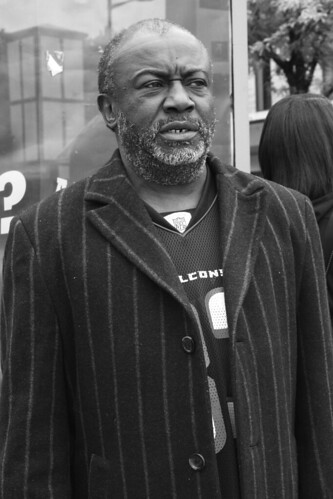In his childhood dreams, John Turner wanted to be a fireman. Turner said he wanted to be immersed in the sounds of sirens piercing through the air as he fought blazing fires with water.

“Saving people’s lives would have been exciting,” he said, “but I never got to be a fireman.”
Though Turner ended up saving lives in another form – Turner spent four years in the military – the consequences of wartime bled into his everyday life when he was discharged in 1973 after serving in Vietnam for three years.
“Most of the guys in Vietnam would be on drugs because you’re up all night and you’re scared,” Turner said. The grey speckles in his black beard matched the grey wool pinstripe overcoat he wore to keep warm on a cool spring Sunday as he waited for the 3 Bus.
“The drugs made you not scared,” he added.
Though many military men smoked marijuana while in Vietnam, transitioning back to everyday life in the United States wasn’t easy. Turner came home expecting to forget about being high, but it was too difficult to wean himself off the drugs. He continued smoking marijuana before starting crack.
“I learned to live to use and use to live,” Turner, who is currently not using, said. “I was a real addict. It took a lot of life from me and made me not a strong person anymore. And it made the wishes go away because all I wanted to do was get high. So I worked at my little crummy job to pay the rent and get high, and I just settled for that.”
Today, Turner still struggles with his addiction. Transition programs for returning soldiers weren’t commonplace immediately after the Vietnam War or when Turner came back to the U.S., but Turner said he used the Veterans Administration Program, though it did little, he said.
However, the program set him up with the psychiatrist he currently sees. After the recent loss of his mother, the psychiatrist recommended Turner attend addict meetings.
“Not using is hard for me, and I’m not using,” Turner, who shares the same last name as Atlanta Falcons running back Michael Turner, whose jersey he wore. “Then my mom died, so I’m really going through something right now.”
Despite his troubles, Turner continues to visit his 41-year-old daughter in North Philadelphia every Sunday from Overbrook, where he now lives to separate himself from temptation.
And, even though he never became a fireman, Turner recommends young people continue to pursue their dreams.
“You might find happiness,” he said, “and to not be happy is really hard. I think life is easier when you’re happy instead of struggling to live life day by day.”
Ashley Nguyen can be reached at ashley.nguyen@temple.edu.



Be the first to comment